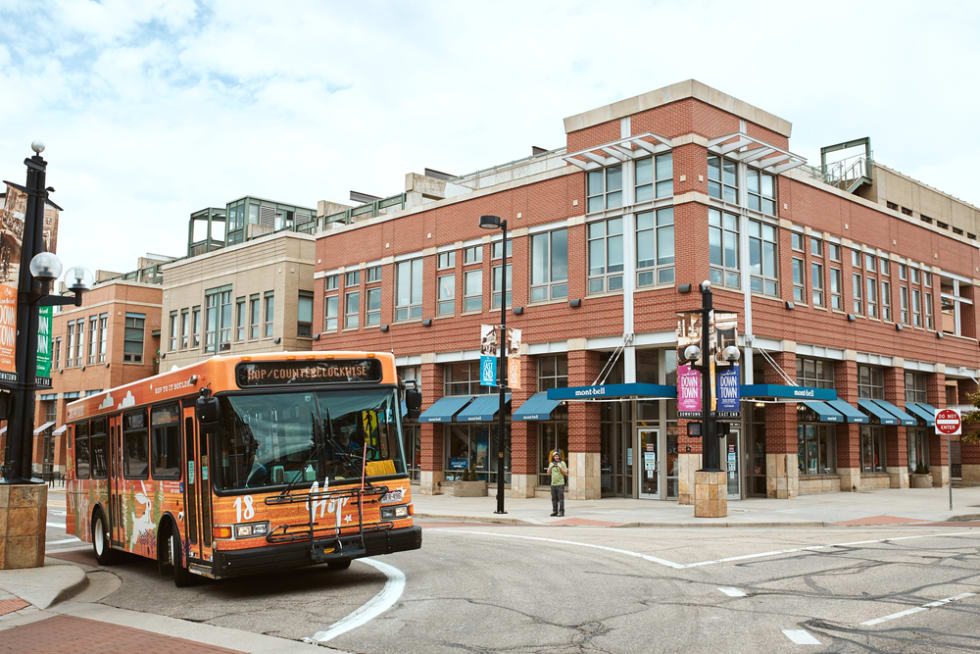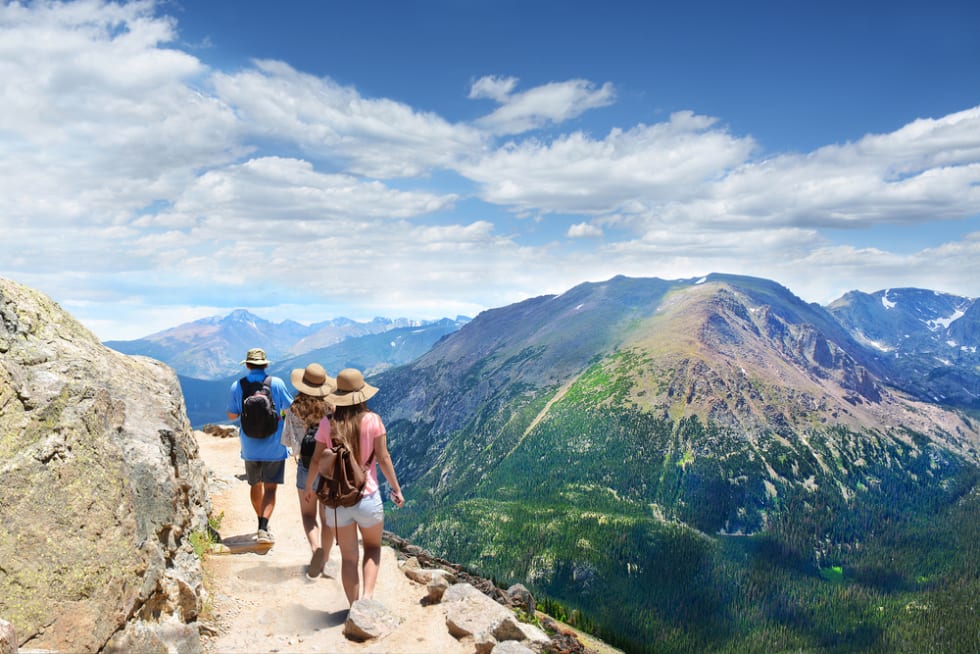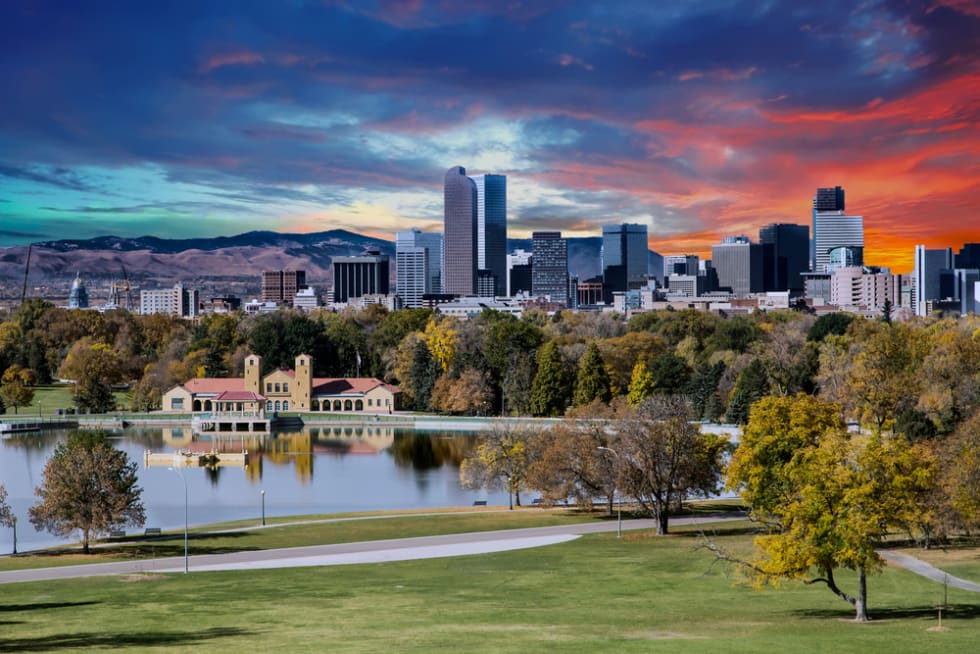- 72 units available
- Studio • 1 bed • 2 bed
- Amenities
In unit laundry, Wine room, Patio / balcony, Granite counters, Hardwood floors, Dishwasher + more

Colorado is a nature lover’s dream. The gorgeous mountain backdrop, the famed Great Plains, and a rolling cityscape make Colorado the perfect destination for a variety of prospective residents.
However, whether you’re an outdoor adventurist or searching for an urban jungle, planting roots in Colorado will take some serious planning.
If you’re looking to plan your move to The Centennial State, this guide can help. We’ve broken down the cost of living in Colorado to help you determine whether the move is financially feasible.
Here’s everything you need to know.
The cost of living in Colorado is 6.1% higher than the national average, making it the fifteenth most expensive state in the U.S.
The most expensive city in Colorado is Glenwood Springs, where the cost of living is 8.79% higher compared to the state average and 15.5% higher than in the rest of the U.S.
The cheapest major city in Colorado is Pueblo, with a cost of living being 7.88% lower compared to the state average and 2.2% lower than the national average.

As of October 2024, the average rent in Colorado overall is $1,662. That breaks down to around $1,445 on average for a one-bedroom and $1,676 for two bedroom apartments. However, rental averages can vary greatly by city. Here are a few of the best places to live in Colorado and their median rent prices:
| City | Median one-bedroom rent | Median two-bedroom rent | Overall rent |
|---|---|---|---|
| Denver | $1,538 | $1,916 | $1,739 |
| Colorado Springs | $1,191 | $1,395 | $1,441 |
| Boulder | $1,553 | $1,937 | $1,855 |
| Fort Collins | $1,317 | $1,486 | $1,548 |
If you’re looking to catch a deal on rent, make your move to Colorado sooner rather than later. Renting with roommates can help you cut your costs even more.
The median home value in Colorado is currently $465,900, while median monthly home costs, including mortgage, sit at $2,109. Colorado offers a variety of housing options for any would-be resident. Like most other states, it’s difficult to quantify the affordability of the state as a whole. This is generally a result of the city-rural disparity, where city-living is typically much more expensive than living in a rural town.

Colorado residents should make at least three times their monthly rent cost to live comfortably. At the overall average rate of $1,677 a month, youu would need to earn at least $67,000 in order to live comfortably in Colorado. Luckily, according the U.S. Census Bureau, the average annual salary for a Colorado resident is $80,184.
Generally, living comfortably means being able to afford all you need, while having some funds left over for fun and saving. As housing costs are generally the highest budget item for most individuals, it’s crucial to start with that number to come up with a target salary range.
If you're working remotely from home, you may be able to save money on your commute to work. Luckily, both Denver and Fort Collins were ranked in the top 10 in our best cities for remote workers.
According to data from the MIT Living Wage Calculator, Colorado residents pay an average of $9,667 annually on transportation costs. For a family of four, including two children, that expense rises to $16,215.
While you don’t need a personal vehicle in Colorado, it’s definitely worth the convenience to have one. For one, you’ll need something to haul all your outdoor gear from one gorgeous location to another. Beyond your weekend camping getaways, the public transportation system in Colorado is sub-par.
Denver, of course, has a serviceable public transportation system, but it’s designed to serve those living within the downtown area. If you live in a less populated city, such as Colorado Springs, you’ll have a hard time relying solely on public transportation to get around.
Owning a personal vehicle comes with a variety of expenses, including maintenance, fuel, insurance, and a car note.
Alternatively, a monthly bus pass costs $114 for a Denver resident, totaling a low $1,368 for the year.
When making a move to a new state, it’s crucial to understand how that state’s costs will differ from your current state. You can compare your monthly average to the average monthly food costs in Colorado. Single Colorado residents spend $333.25 per month on food, while a family of four spends an average of $980.33. If you’re a budgeting master, you’ll likely already have a budget line item with your average food costs. If not, spend the next month tracking your food expenditure to get an estimate.
If you’re looking to save on restaurant excursions, limit them to once a month or less. They can be quite expensive and eat up over a quarter of your monthly grocery budget.
According to Numbeo, here’s what you can expect to pay for a meal for two at a mid-range restaurant in Colorado, including the standard 15% gratuity:
The average single Colorado resident spends $2,714 annually on medical costs, while a family of four with two children and two working adults spends $8,516 on medical costs yearly. Generally, health insurance policies provided through your work will be less expensive than private coverage, which is why it’s crucial to determine whether your job will be providing health insurance coverage before making the move to Colorado.
If you find yourself on the market for health insurance coverage in Colorado, Connect for Health is a private insurance marketplace, Health First Colorado offers coverage for low-income individuals, and Public Health Services are available throughout the state.
The average utility bill in the U.S. sits at $253.14 for basic electricity, gas, and water. In Colorado, that number is much lower at $237.77. However, several major cities are above the national average, as we see below:
| Location | Avg Electric | Avg Gas | Avg Water | Avg Fuel | Total |
|---|---|---|---|---|---|
| Colorado | 121.62 | 63.64 | 50.58 | 1.93 | 237.77 |
| Colorado Springs, CO | 156.32 | 63.54 | 52.25 | 1.22 | 273.33 |
| Denver, CO | 131.08 | 50.56 | 81.92 | 1.00 | 264.57 |
| U.S. | 150.93 | 51.12 | 45.52 | 5.57 | 253.14 |
Utilities are one of the most variable costs you’ll encounter while budgeting. This is especially true in a state like Colorado, which experiences rapid weather changes.
A significant portion of the state lies at a very high elevation, which results in high diurnal temperature variations (daily highs and lows). As a result, it can be challenging for renters to estimate utility costs.
One of the best ways to standardize your utility payments is to set up a “budget payment plan” to create a consistent monthly payment based on your current usage and avoid seasonal surges. You’ll only experience a price change once per year when your rate is updated to reflect a full year of usage.
In addition to the most common utilities, you’ll have to budget for cell phone and internet service. The average American spends $114 per month for their cell phone service and an additional $30 to $70 a month for internet service. Consider bundling your cell phone and internet service to lower your monthly rate.

Colorado may fly under the radar when it comes to fitness and entertainment opportunities, but it’s by no means a “boring” locale.
While there is always something for the outdoor lovers, there are also tons of entertainment and recreation opportunities for those who prefer a little less nature in their lives.
We’ve broken down the costs of popular fitness and recreation opportunities in Colorado to help you work them into your budget.
Fitness costs vary greatly depending on your location in Colorado. Though you can find cheap fitness facilities and sports available across the state, you'll have to spend a pretty penny if you prefer a premium indoor gym experience. Here’s what the cost of a monthly gym membership looks like in Colorado:
Yes, parks offer great outdoor recreation opportunities. However, if you’re a fan of frugality, the best thing about parks is that they are usually completely free to visit and enjoy. There are a ton of great state park options to check out in Colorado, but we recommend you get started with Cheyenne Mountain State Park.
With over 28 miles of trails for hiking, biking, walking, jogging, and general getting around, Cheyenne Mountain State Park is more of a weekend activity. Picnic areas, playgrounds, wildlife education, an archery range, guided wildflower walks, and family mystery hikes make for all-day fun.
Make a weekend out of your visit by setting up a tent at the campsite for a couple of days. Just make sure you come prepared.
The Colorado sports market isn't lacking by any means. With a major league professional baseball, basketball, football, and soccer, there are plenty of opportunities to catch a game in Colorado.
That said, most teams are located in Denver, so if you choose another city or town other than Denver, you’ll be in for a drive. Here’s a breakdown of the average ticket prices for sports contests in Colorado.
Whether you’re taking your family for a day out or simply wish to spend some time adding a little culture to your life, Colorado has tons of museums to help whet your appetite. Good news for your budget — museums are usually inexpensive and offer tons of discounts. Better yet, some of the museums on this list are completely free!

Colorado isn’t without its hidden expenses. Although these costs are known to most long-term residents, many new residents fail to include these costs in their budgets. To help you avoid missing these expenses, we’ve pulled together a list of additional costs to consider in Colorado:
Moving to Colorado certainly has its advantages. The state is beautiful, offers an abundance of entertainment opportunities, and isn’t wildly expensive.
If that’s enough to get you searching for plane tickets, then it’s time to start your search for your dream apartment in Colorado. Take the quiz above to get started, or simply start browsing apartment listings across the state of Colorado!
Learn about living in Colorado cities:
Denver
Boulder
Colorado Springs
Where you live in Colorado will depend on your expenses, but the current overall average for apartments in Colorado is $1,677 a month.
Some of the cheapest rents in Colorado are found in Pueblo, which has the lowest cost of living in the state, and where you can find apartments starting at $799 a month.
Your expenses will vary depending on where you live in Colorado. The average rent for a one bedroom apartment in Colorado ranges from $1,225 to $1,509 for a one-bedroom apartment.
Single Colorado residents spend $333.25 per month on food, and a family of four spends about $980.33. Colorado residents spend about $4,938 annually on transportation. A family of four spends $13,456 on transportation.
Colorado to Texas is 736.9 miles and takes just over 12 hours to drive via 1-25 N.
Colorado to California is 1,118.3 miles away and takes almost 18 hours to drive. The fastest route is via I-15 N and I-70 E.
Colorado to Florida is 1,966 miles and takes 29 hours to drive. The fastest route from. Colorado to Florida is via I-70 W.
According to the US Census Bureau, the population of Colorado was 5,839,926 in 2022.
The U.S. Census Bureau reports that the median household income for Colorado residents is $80,184. However, you should aim to only spend 30% of your income on rent.
In Boulder, you'll need an average income of $60,360 to afford a one bedroom apartment and $76,920 for a two bedroom.
In Denver, you will need a salary of $55,960 to live comfortably in a one bedroom apartment and $69,240 in a two bedroom.
If you live in Aurora, you need at least $54,520 for a one bedroom apartment and $67,000 in a two bedroom.
Living in Colorado Springs requires $49,000 for a comfortable lifestyle in a one bedroom apartment. You'll need $61,400 to live comfortably in a two bedroom apartment.


In unit laundry, Wine room, Patio / balcony, Granite counters, Hardwood floors, Dishwasher + more
In unit laundry, Patio / balcony, Hardwood floors, Dishwasher, Pet friendly, New construction + more